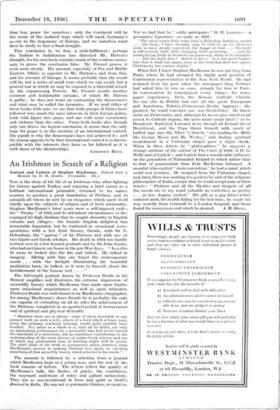An Irishman in Search of a Religion
Tins is the story of the life of an Irishman who, after fighting for Greece against Turkey and enjoying a brief career as a brilliant international journalist, returned to his native country to produce a great translation of Plotinus and to astonish all whom he met by an eloquence which spent itself chiefly upon the subjects of religion and of Irish nationality. Stephen MacKenna's later years were a self-imposed exile ; the "Treaty "of 1922 and its attendant circumstances so dis- couraged his, high idealism that he sought obscurity in English suburbs and villages : the humble English delighted this intractable Separatist, but he continued in occasional corre- spondence with a few Irish literary friends, with Sir E. Debenham, the " patron " of his Plotinus and with one or two Gaelic and Greek scholars. His death in 1934 was hardly noticed save in a few learned journals and by Sir John Squire, who had met him in my house in the pre-War days. "In a dim lit room he looked into the fire and talked. He talked in imagery. Sitting with him one forgot the contemporary world . . . with the firelight illuminating his beautiful meditative brow, he talked, as it were to himself, about the bewilderment of the human soul .
The full-length portrait drawn by Professor Dodds in his Memoir amplifies and illustrates the extreme impression of unworldly beauty which MacKenna thus made upon Squire, upon occasional acquaintances as well as upon intimates. Professor Dodds was well chosen to be MacKenna's biographer,
for among MacKenna's closer friends he is probably the only one capable of estimating on all its sides the achievement of the Plotinus, completed in an agonised period of bereavement and of spiritual and physical ill-health.
"Blunders there are in plenty—some of them inevitable in any pioneer work on such a text, others of a kind which a lesser man, given the ordinary academic training, would quite possibly have avoided. Yet taken as a whole it is, with all its faults, not only an astonishing performance for a journalist who had never crossed the threshold of a university, but an important contribution to the understanding of the most obscure of major Greek writers, and one of which any professional man of learning might well be proud. The chief claim of the work to permanence arises, however, from MacKenna's success in making Plotinus live again, in catching something of that unearthly beauty which attaches to his words."
The memoir is followed by a selection from a journal which MacKenna kept as a young man, and the rest of the book consists of letters. The letters reflect the quality of MacKenna's talk, the flashes of gaiety, the courtliness, the wayward undertone of witty and gallant melancholy.
They are as unconventional in form and spirit as Swift's Journal to Stella. He was not a systematic thinker, or creative. Yet we find that he "oddly anticipates" D. H. Lawrence –a persuasive Lawrence—as early as 1907.
"The mind seems little more than a flickering, babbling stream . . . the body, I have thought, may be God 'or, as the liebrews seem to have deeply conceived, the Image Of God. .. . The body is self-centred, dark, little changing, little answering . . . and the mind playing dimly at its skirts can guess only dimly at its thoughts. . . . But the body dies 1 And if it does 1 Is it not good Pauline lore that it shall rise again, even as the God that died rose again? Christianity has curious depths."
When first I knew Stephen MacKenna he was not long from Paris, where he had occupied the highly paid position of Continental representative of the New York World. He had resigned from his post when the newspaper king Pulitzer had asked • him to run on some errands for him in Paris. In conversation he transfigured every thing : his news- paper experiences, Irish, the Roman Catholic Church.
No one else in Dublin had met all the great Europeans and Americans, Tolstoi, Clemenceau, Rodin, Apponyi : the greatest, he could convince one, was Rockefeller. He threw scorn on Protestants, and, although he never gave intellectual assent to Catholic dogma, the news many years later (" to be Broadcast, Radiated, Listened in to, though all Ireland die of heartbreak, and the Pope throw himself with snarls of
baffled rage into the Tiber ") that he was reading the Bible like George Moore and Mr. Wesley," and finding spiritual nourishment in a Unitarian chapel gave a slight shock. When in these letters he " philosophises " he suggests a strange mixture of the author of The Crock of Gold, of II. G. Wells and of Carlyle ; and Carlyle had a considerable influence on the generation of Nationalist Ireland to which rather than to that of grammarian Sinn Fein MacKenna belonged. A moralist Who exalted "stern conviction," he had a mind which could rest nowhere. He resigned from the Unitarian chapel, and, later, there was nothing too good to be said of the religious philosophies of India, except that he could accept none of their tenets : "Plotinus and all the Mystics and Gospels of all
the creeds are to my mind valuable as corrective, as poetry
. . . as law, dogma, wicked." His gift as a gay letter-writer endured until, his health failing for the last time, he made his
way secretly from Cornwall to a London hospital, and there
found the anonymous end which he desired. J. M. HONE.










































 Previous page
Previous page